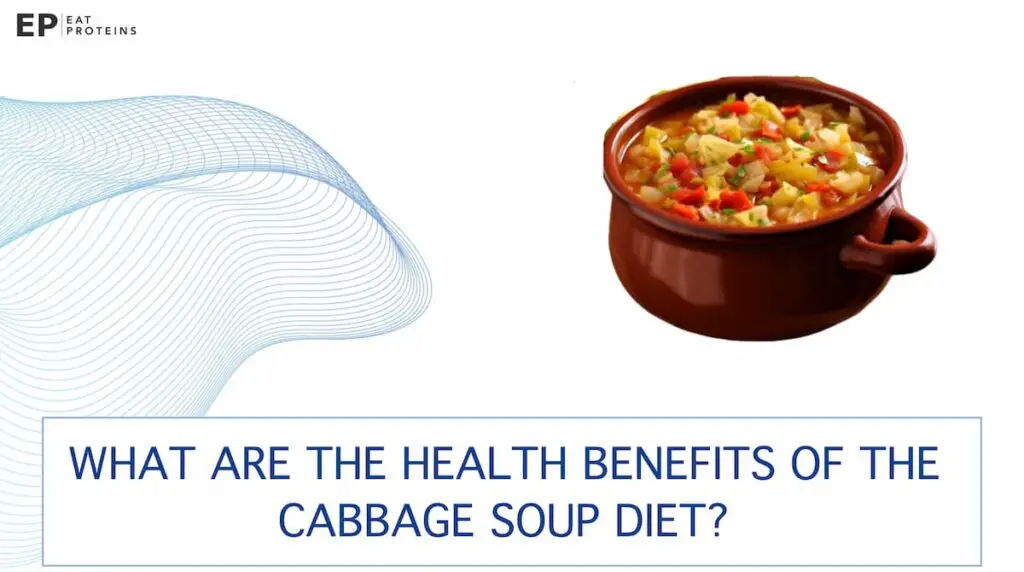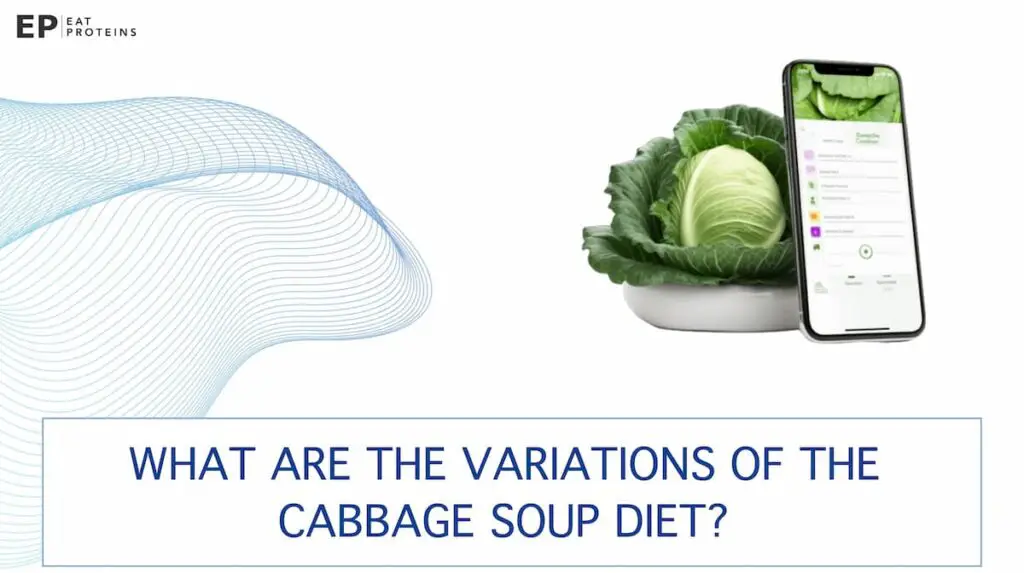The cabbage soup diet is designed for short-term weight loss and does not require long-term commitment. However, the daily calorie intake on the diet is significantly lower than what is considered safe for long-term consumption. The diet claims to help individuals lose 10 pounds (4.5 kilograms) in 7 days, but most of the weight lost is water, not fat.
Losing such a significant amount of fat within a week is nearly impossible. The diet lacks balance and may not provide sufficient nutrients for overall health. Side effects of the cabbage soup diet include dehydration, headaches, dizziness, nausea, fatigue, gas, bloating, muscle loss, brain fog, and nutrient deficiencies. This article gives you a complete rundown of this popular diet, including its benefits, risks, sample meal plans, and alternative diets.
What is the Cabbage Soup Diet?
The Cabbage Soup Diet involves consuming cabbage soup multiple times a day for a week in order to achieve rapid weight loss. According to a 2014 study by Yong Zhu from The University of Iowa, soup consumption is associated with a lower risk of obesity and aids in body-weight management. the study found that people who ate soup (1,291 individuals) had lower body weights and smaller waist sizes compared to those who didn’t eat soup (9,307 individuals). These differences were statistically significant, meaning they are likely not due to chance.
While this diet is popular, it is considered a fad diet and not recommended for long-term use. There is no scientific evidence to support the safety or long-term effectiveness of this diet. Most of the weight lost during the cabbage soup diet is water weight, not fat. It is advisable to consult with a certified nutrition coach or registered dietitian before attempting this diet and to consider safer and more sustainable eating plans for long-term success.
What is the history of the Cabbage Soup Diet?
The history of the cabbage soup diet is unclear, as no specific person or institution is credited with its creation. However, it gained popularity in the 1980s through faxlore. Despite its lack of scientific backing, the diet gained fame and was promoted by celebrities such as Joanna Lumley, Dolly Parton, and movie actress Sarah Michelle Gellar, due to its promise of rapid weight loss.
How does the Cabbage Soup Diet work?
The cabbage soup diet is a rapid weight loss diet that involves eating unlimited amounts of homemade cabbage soup and a few other low-calorie foods each day.

It claims to help individuals lose up to 10 pounds in one week, but most of this weight loss is likely to be water and not fat.
In addition to the cabbage soup, you are allowed to have 1-2 other low-calorie foods daily, such as non-starchy vegetables like spinach, broccoli, and cauliflower. The cabbage soup diet is intended for short-term use to jump-start a longer-term diet plan.
The main component of this diet is the cabbage soup, which is prepared using ingredients like onions, green peppers, tomatoes, celery, cabbage, carrots, mushrooms, bouillon cubes, and water or vegetable cocktails. You can eat as much cabbage soup as you want throughout the day.
What are the pros and cons of the Cabbage Soup Diet?
The pros and cons of the cabbage soup diet are as follows:
Pros
- Quick weight loss: The low-calorie nature of the diet can lead to significant weight loss in a short amount of time. On average, people may lose around 10 pounds (4.5 kilograms) in a week.
- Simple and affordable meal plan: The cabbage soup diet is easy to follow and doesn’t require expensive or complicated ingredients. Cabbage and other vegetables are readily available and cost-effective.
- High fiber content: The diet includes vegetables, which are rich in fiber and can promote healthy digestion. This can help regulate bowel movements and improve overall gut health.
- Detoxification: The soup is made with vegetables that are known for their detoxifying properties, such as cabbage and onions. These ingredients can help cleanse your system and eliminate toxins.
Cons
- Nutrient deficiencies: The diet lacks balance and may not provide sufficient nutrients for overall health. It is low in protein, healthy fats, and essential vitamins and minerals, which can lead to deficiencies if followed for an extended period.
- Temporary weight loss: Most of the weight lost during the diet is water weight and not fat, so the results may not be long-lasting. Once the diet is discontinued, the lost weight may be regained quickly.
- Potential side effects: Some people may experience side effects like dehydration, fatigue, and nutrient deficiencies. This is especially true if the diet is followed for an extended period or without proper medical supervision.
- Unsustainable: The cabbage soup diet is designed for short-term weight loss and may not be a sustainable long-term eating plan. It can be monotonous and restrictive, making it difficult to adhere to in the long run.
What are the health benefits of the Cabbage Soup Diet?
Five health benefits of the Cabbage Soup Diet are listed below.

- Weight loss: The cabbage soup diet is known for its ability to promote weight loss. Since the soup is low in calories and high in fiber, it can help create a calorie deficit and support weight loss goals.
- Detoxification: Cabbage is rich in antioxidants, which help neutralize harmful free radicals and support detoxification processes in the body. This can help improve overall health and well-being.
- Digestive health: The high fiber content in cabbage soup can aid in digestion and promote a healthy digestive system. Fiber adds bulk to the stool, preventing constipation and promoting regular bowel movements.
- Nutrient-rich: Cabbage is packed with essential vitamins and minerals, such as vitamin C, vitamin K, potassium, and manganese. These nutrients are important for various bodily functions, including immune health, bone health, and energy production.
- Heart health: The cabbage soup diet can contribute to heart health due to its low-calorie and low-fat nature. It can help reduce cholesterol levels and lower the risk of heart disease.
How much weight can you expect to lose on the Cabbage Soup Diet?
On the cabbage soup diet, you can expect to lose up to 10 pounds (4.5kg) in a week. The diet is designed for short-term weight loss and does not require long-term (3-6 months) following. It is wise to transition to a more balanced and nutritious meal plan after completing the diet to maintain weight loss and overall health.
What are the side effects of the Cabbage Soup Diet?
The following are the 9 common side effects of the Cabbage Soup Diet.
- Dehydration: Dehydration may occur due to the low-calorie and limited variety of foods in the cabbage soup diet, leading to symptoms like thirst, dry mouth, and decreased urination.
- Headaches: The cabbage soup diet can cause headaches, which manifest as pain or discomfort in the head, potentially due to low-calorie intake or nutrient imbalances.
- Dizziness: On this diet, dizziness can make you feel lightheaded or unsteady due to a lack of sufficient nutrients or low blood sugar levels.
- Fatigue: The cabbage soup diet may lead to fatigue, resulting in extreme tiredness or lack of energy, often due to inadequate caloric intake or nutrient deficiencies.
- Gas: The consumption of cabbage soup may lead to gas, resulting in abdominal discomfort or bloating.
- Bloating: The cabbage soup diet may cause bloating, which could be due to the high fiber content in cabbage.
- Muscle Loss: Due to its low protein content, the diet may result in muscle loss, which is undesirable for overall body composition.
- Brain Fog: The low-calorie and nutrient-restricted nature of the diet can lead to brain fog, causing a lack of focus and cognitive difficulties.
- Nutrient Deficiencies: The limited range of foods in the cabbage soup diet can result in nutrient deficiencies, leading to symptoms like weakness, fatigue, hair loss, and a weakened immune system.
How do you start the Cabbage Soup Diet?
To start the cabbage soup diet, gather the necessary ingredients and follow the provided meal plan. Here’s a step-by-step guide:

- Purchase fresh cabbage (1 head), onions (2), bell peppers (2), celery (2 stalks), carrots (2), tomatoes (6), and any other vegetables you prefer. You will also need vegetable broth (6 cups), herbs (such as parsley or bay leaves), and spices (like garlic powder or black pepper).
- Chop all the vegetables into desired sizes and simmer them in the vegetable broth for about 20 minutes or until they are tender. Add herbs and spices according to your taste preference.
- The cabbage soup diet typically involves consuming cabbage soup for most meals throughout the week. Each day, you can have unlimited amounts of cabbage soup along with specific additional foods.
- It is crucial to drink plenty of water throughout the day to stay hydrated and help flush out toxins from your body. Aim for at least 8 cups of water per day.
How long can do the Cabbage Soup Diet for?
The cabbage soup diet can be followed for a maximum of seven days.
Can you follow the Cabbage Soup Diet for 30 days?
No, it is not advisable to stick to the cabbage soup diet for 30 days in order to achieve your weight loss goals. While the diet may promise quick results, there are several risks and limitations to consider.
What are the before and after results for a 30-day Cabbage Soup Diet?
The before and after results for a 30-day cabbage soup diet typically include significant weight loss, often ranging between 10 to 20 pounds. However, the diet comes with potential risks like nutrient deficiencies, muscle loss, and side effects such as fatigue and dizziness.
What foods can you eat on the Cabbage Soup Diet?
On the cabbage soup diet, you can eat a variety of foods including fruits, vegetables, lean proteins, and of course, cabbage soup. Some examples of foods you can enjoy on this diet include:
- Fruits: You can have a wide range of fruits such as apples, oranges, berries, and melons. These fruits provide essential vitamins, minerals, and fiber.
- Cabbage: The cabbage soup is the mainstay of the cabbage. It is a low-calorie and filling option that can be enjoyed throughout the day.
- Vegetables: In addition to cabbage, you can incorporate other vegetables like broccoli, carrots, onions, and peppers. These vegetables are low in calories and rich in nutrients.
- Lean Proteins: Foods like chicken breast, turkey, fish, and tofu can be included in your meal plan. These protein sources are low in calories and help keep your calorie intake in check.
What vegetables are allowed on the Cabbage Soup Diet?
The cabbage soup diet allows for a variety of vegetables. Here are four vegetables that are commonly included in the cabbage soup diet:
- Carrots: Carrots are a great addition to the cabbage soup diet as they are high in beta-carotene, which can support healthy eyesight and boost the immune system.
- Celery: Celery is known for its low calorie and high water content, making it a popular choice for the cabbage soup diet. It is also a good source of vitamins A, C, and K.
- Bell peppers: Bell peppers not only add vibrant colors to the soup but also provide antioxidants and vitamin C, which can support the immune system.
What foods are not allowed on the Cabbage Soup Diet?
To make the most of the cabbage soup diet, there are certain foods you should avoid due to their high calorie and sugar content.
- High-Sugar Foods: Sweets, sodas, and desserts.
- Processed Snacks: Chips and cookies.
- Fried Foods: Fried chicken and French fries.
What is the daily caloric intake on the Cabbage Soup Diet?
The daily caloric intake on the cabbage soup diet is typically around 800-1,000 calories per day. This is significantly lower than the recommended daily calorie intake for adults, according to the FDA dietary guidelines in the United States, which is around 1,800-2,400 calories for women and 2,200-3,000 calories for men.
What is the 7-day meal plan for the Cabbage Soup Diet?
The 7-day meal plan for the cabbage soup diet includes specific foods for each day.
- Day 1: Indulge in as much cabbage soup as you’d like, complemented by a variety of fruits, except for bananas.
- Day 2: Enjoy unlimited servings of cabbage soup and pair it with an array of vegetables. For dinner, treat yourself to a baked potato topped with a pat of butter.
- Day 3: Savor endless bowls of cabbage soup and mix in both fruits and veggies, but steer clear of bananas and potatoes.
- Day 4: Feast on unlimited cabbage soup, coupled with bananas and skim milk to keep you satiated.
- Day 5: Relish limitless cabbage soup, and add some protein with beef or chicken. You can also have up to 6 fresh tomatoes throughout the day.
- Day 6: Consume as much cabbage soup as you desire, along with beef or chicken and a variety of vegetables. Feel free to have as much beef as you like.
- Day 7: For the final day, enjoy unlimited cabbage soup, brown rice, and vegetables. Wash it all down with some unsweetened fruit juice.
What is the original recipe for the Cabbage Soup Diet?
The original recipe for the cabbage soup diet includes the following ingredients:
- 1 head of cabbage, chopped
- 6 large onions, diced
- 6 green bell peppers, sliced
- 6 celery stalks, chopped
- 2 cans of tomatoes, diced
- 1 package of dry onion soup mix
- Herbs and spices for flavor (optional)
To prepare the soup, follow these instructions:
- In a large pot, add all the ingredients.
- Cover the ingredients with water and bring to a boil.
- Reduce the heat and simmer for about 45 minutes or until the vegetables are tender.
- Season with herbs and spices to taste.
How much water should you drink on the Cabbage Soup Diet?
On the Cabbage Soup Diet, it’s recommended to drink at least 10 cups (80 ounces) of water daily to maintain hydration and support bodily functions. This recommendation aligns with the general guidelines from the Institute of Medicine, which advises 3.7 liters (125 ounces) of total water intake for men and 2.7 liters (91 ounces) for women.
Ensuring adequate water intake is particularly important on a low-calorie diet like the Cabbage Soup Diet to mitigate the risks of dehydration, kidney stones, and poor cognitive performance.
Can you add protein to the Cabbage Soup Diet?
Yes, you can add protein to the cabbage soup diet. Including protein-rich foods in your cabbage soup diet can provide several benefits and enhance the effectiveness of the diet. Protein is known to increase feelings of fullness and reduce hunger. Adding protein to your cabbage soup can help you stick to the diet without feeling deprived.
What is the best protein powder for the Cabbage Soup Diet?
For the Cabbage Soup Diet, the best protein powder depends on your individual needs, but options include Whey Protein, Plant-based Protein, and Collagen Protein.
What are the variations of the Cabbage Soup Diet?
There are four variations of the Cabbage Soup Diet.

- Mayo Clinic Cabbage Soup: The Mayo Clinic variation of the cabbage soup diet includes a meal plan featuring cabbage soup, fruits, vegetables, and meat. While it promises benefits like rapid weight loss and detoxification, it also comes with risks such as nutrient deficiencies and low-calorie intake.
- Weight Watchers Cabbage Soup: The Weight Watchers variations of the cabbage soup diet include cabbage soup, fruits, vegetables, and grains. It focuses on benefits like portion control and balanced meals, but there is a risk of potential rebound weight gain.
- Dolly Parton Cabbage Soup: The Dolly Parton Cabbage Soup meal plan consists of cabbage soup, fruits, vegetables, and yogurt. It offers benefits like low fat and low-calorie intake but comes with risks such as limited food choices and meal monotony.
- Sacred Heart Cabbage Soup: The Sacred Heart Variation of the cabbage soup diet includes a meal plan featuring cabbage soup, fruits, and vegetables. It promises quick results and improved digestion but lacks scientific evidence to support these claims.
Other variations like the Military Cabbage Soup Diet, TJ Miracle Soup Diet, and Russian Peasant Diet focus on quick weight loss through a limited range of foods. However, they also lack strong scientific evidence to support their effectiveness.
How does the Mayo Clinic version of the original Cabbage Soup Diet differ?
The Mayo Clinic version of the original cabbage soup diet differs by offering a modified approach to the diet plan. It includes a wider variety of foods to provide more nutrients and balance. The original cabbage soup diet recipe from the Mayo Clinic allows for the consumption of fruits, vegetables, lean protein, and whole grains throughout the week.
This modified Mayo Clinic cabbage soup diet aims to address concerns associated with the original cabbage soup diet, such as nutrient deficiencies and limited food choices.
How is the Cabbage Soup Diet different from other fad diets?
The Cabbage Soup Diet differs from other fad diets in several key aspects. Unlike detox or fasting diets, it focuses on the consumption of low-calorie cabbage soup and a limited range of other foods, rather than eliminating food groups or promoting cleanses. It also has a short duration, typically lasting only 7 days, which sets it apart from diets that recommend long-term commitments or lifestyle changes.
How is the Cabbage Soup Diet different from a Detox Diet?
The cabbage soup diet and a detox diet differ in their approach to cleansing the body. The cabbage soup diet is centered around consuming large amounts of cabbage soup along with other low-calorie vegetables and fruits. On the other hand, a detox diet involves consuming a variety of nutrient-rich foods, such as fruits, vegetables, whole grains, and lean proteins, while avoiding processed foods, alcohol, and caffeine.
What are the differences between the Cabbage Soup Diet vs Military Diet?
The Cabbage Soup Diet and the Military Diet are both short-term, low-calorie diets, but they differ in food variety and focus. The Cabbage Soup Diet primarily involves consuming cabbage soup and a limited selection of fruits and vegetables for 7 days. In contrast, the Military Diet includes a more diverse range of foods like toast, eggs, and tuna, and lasts for only 3 days, followed by 4 days of regular, but controlled, eating.
Is there a PDF version of the 7-day cabbage soup diet?
No, there is no official PDF version of the 7-day cabbage soup diet. However, you can easily find the original cabbage soup diet recipe in PDF format online.

